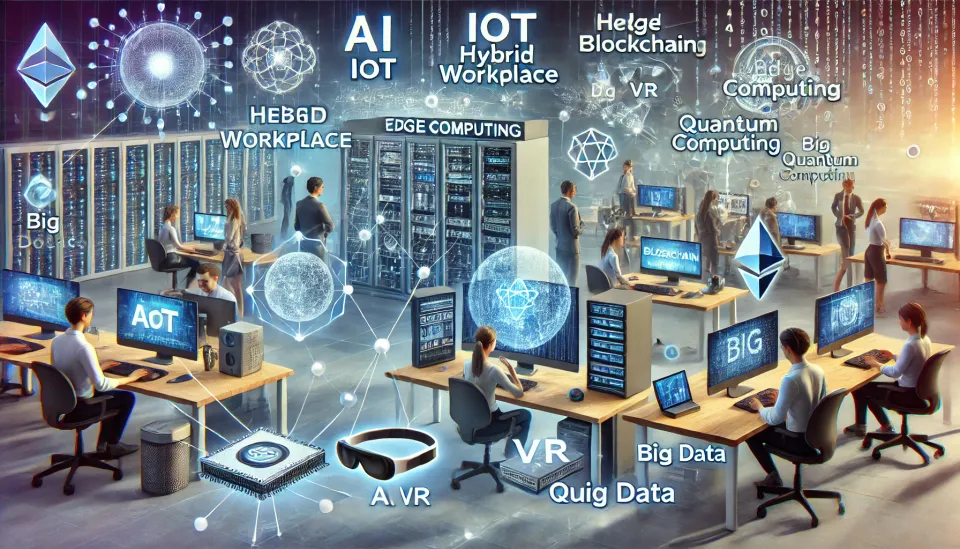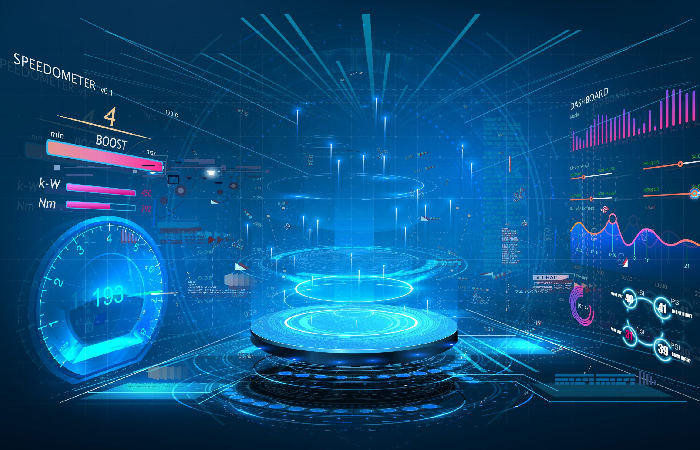7 Game-Changing Tech Trends Transforming Everyday Life: A Riveting Exploration

Are you ready to uncover the future? Hold on tight as we start our journey through 7 mind-blowing tech trends that are going to change the game and revolutionize your future. Get ready to witness—from remarkable advancement in AI to the boundless potential of the metaverse—the cutting-edge innovations reshaping industries and enhancing our world.
Imagine an AI-enabled world without complicated work, an edge-computing world full of real-time interactivity, and a blockchain world in which trust and security redefine business. These technologies are not some breakthrough ideas but fast-changing realities that are bound to change everything, from our workplaces to daily routines.
Think of a future where Internet of Things connects billions of physical objects, enabling ubiquitous computing and unlocking new world possibilities in every industry. Hybrid models of work and digital technologies that enable remote collaboration redefine the balance between work and life. And data-driven insights through big data analytics guide us to decision-making like never before.
This is just the beginning. Be prepared to engage with the convergence of all these technology trends, from AR and VR to the Metaverse to quantum computing or the very frontier of the Internet of the next generation. Be ready for your own mind to be awakened to the power of technology and a myriad of solutions it brings into our lives.
The Transformative Power of Technology: 7 Game-Changing Trends
The world is changing very quickly, and technology leads this transformation. Seven major technology trends will dramatically change different parts of our daily lives in the near future: from artificial intelligence, blockchain, and the metaverse to leading-edge advancements that reshape industries and redefine the way we work, live, and interact.
Artificial Intelligence is dealing with complicated issues and providing their solutions through its machine-learning capabilities. IoT is here to connect physical objects, paving the way for ubiquitous computing and new concepts. The redefinition of work-life balance is brought in by hybrid work models and remote collaboration tools.
Edge computing is about bringing real-time communication and processing power closer to the source. Blockchain changes the architecture of trust and data availability. Immersive technologies, including augmented reality (AR), virtual reality (VR), and metaverse, bring a new wave of converging technology trends around advanced collaboration.
Plus, new horizons — such as quantum computing and bioengineering — develop at ever-accelerating rates and promise groundbreaking solutions for a manifold of various domains. Let's have a look at some of these transformative technology trends and the way they will shape our future.
There are seven major technology trends: AI, IoT, hybrid work models, edge computing, blockchain, and immersive technologies in addition to the emerging frontiers like quantum computing, which are changing various facets of our lives.
Artificial Intelligence: The Driving Force Behind Innovation
Artificial intelligence has developed into the driving force behind innovation, shaking whole industries and changing our way of solving complex tasks lying before us. From generation AI that can generate man-like text, image, and video to computer learning algorithms that scale into millions in analyzing data logs, AI is opening up new avenues of possibility and really pushing what we thought possible.
Probably the area in which AI can make a huge difference is assistive technology. AI-powered Virtual Assistants and Chatbots are getting stronger at understanding human queries and replying to them, making personalized support possible with an increase in productivity. AI has aided disease diagnosis, drug discovery, and personalized treatment plans in health care—improving significantly over patient outcomes and smoothing hospital processes.Digital Marketing and AI open up a new frontier for companies, which go beyond understanding their customers intimately to really interacting with them in a more personal, timely, and impactful manner.
AI Applications Revolutionizing Industries
AI is playing a pivotal role in how many industries function today, all the way from manufacturing and logistics to finance and retail. In manufacturing, AI-driven robots and automation systems bring about the optimal production lines for minimized errors and enhanced efficiency. In finance, it analyzes market trends, detects fraud, and makes data-driven investment decisions. AI is being used by retailers in areas such as personalized suggestions, managing inventory, and predictive analytics for enhancing customer experience.
AI, through generative models, machine learning, and assistive technology, is driving innovation across industries, enabling new possibilities and revolutionizing complex tasks.
Internet of Things (IoT): Connecting the World
The Internet of Things is the fast-growing network of things or objects, mainly consisting of physical devices and sensors interlinked with each other and capable of generating, receiving, processing, and sharing huge amounts of data on the Internet. This concept of ubiquitous computing has already started redesigning how we relate to the world that surrounds us: new dimensions in automation, efficiency, convenience.
Today, devices are in use within applicative domains of smart homes, cities, and industries regarding automation and healthcare. Other potential uses of smart home systems include control of light, temperature, and appliances from anywhere in the world and smart city initiatives run via IoT sensors managing traffic, energy optimizing, and ensuring public safety.
Additionally, IoT sensors monitor for industrial equipment performance and its forecast for servicing. Moreover, they make supply chain operations smoother. IoT devices, in the health sector, would monitor patients for their vital signs, track adherence to medication, and permit remote monitoring for better delivery of care and good outcomes in health.
The IoT can enable companies to transform with innovation, industry-changing service models informed by real-time insight and predictive analytics by connecting things everywhere and giving them the ability to exchange data.
The Internet of Things means a network or connected physical devices and objects that can facilitate ubiquitous computing, automation, and real-time data exchange and analytics across different industries or applications.
Hybrid Workplaces: The Future of Work-Life Balance
The COVID-19 pandemic increased the rate of acceptance for remote work; thus, hybrid models of both in-office and remote collaboration have come about. This has changed not just how the traditional workplace looks but what work-life balance truly means.
Hybrid workspaces capitalize on remote collaboration tools and virtual meeting platforms to make working remotely seamless, much like actual physical presence. This will, in turn, offer staff the flexibility to work from home while developing face-to-face connections and team dynamics whenever needed. In incorporating hybrid working models into the business environment, it increases the ability to attract and retain the best talent, promotes employee well-being, and sustains a more inclusive and diverse pool of employees who form the basis for innovation in business.
These hybrid variants of work models are about to redefine the future of work-life balance. Facilitated by remote collaboration tools, they yield flexibility and welfare for employees.
Unleashing the Potential of Edge Computing
Edge computing is going to revolutionize the way one thinks about data processing and analytics today by moving on from computation power to locations closer to the source of real-time data generation and communication. Edge computing processes data at the edge—closer to devices or sensors—to reduce latency, enhance security, and optimize bandwidth utilization instead of transferring it to some central cloud or data center.
It enables scenarios wherein everything happens in real-time—decision-making to be exact: autonomous vehicles, industrial automation, and remote healthcare monitoring. Therefore, edge computing devices are very prompt at reacting, displaying reduced needs in terms of transferring data constantly to the cloud for processing and analysis.
Edge computing in itself has an inherently very less chance of any infringement of privacy and data sovereignty concerns, as sensitive data is kept local, thereby diminishing the final risk of a_bundle of data during transmission. In this arena, with the demand for low-latency applications and real-time analytics on the rise, edge computing is all poised to assume a dominant role across industries and become a key enabler of new possibilities and innovations.
Edge computing makes computing prowess and real-time communication closer to the source of data. This brings along the advantages of reduced latency, better security, and fast decisions for applications that require real-time responsiveness.
Blockchain: Revolution of Trust and Security
Blockchain technology disrupts all traditional centralized systems by its decentralized, transparent, secure way of data management and transactions. Primarily, it's a dispersed digital recordkeeping platform that records transactions in an immutable manner, hence obliterating the presence of a central authority or intermediary.
This ingenuity on trust architecture has made data available, intact, and transparent and found wide adoption, opening gates to a myriad of industries: finance, supply chain management, healthcare, and government services. Blockchain-based applications can smoothen procedures, decrease costs, and increase trust among parties involved in some rather complex transactions. Further integration of blockchain with other technologies like IoT and AI can provide a lot in secure data sharing, smart contracts, and correspondingly, the automation of procedures in decision-making.
In a nutshell, blockchain technology is one that disrupts trust and security by offering a decentralized, transparent, and immutable digital ledger for the secure sharing of data and conducting transactions pertaining to several industries.
The Rise of Immersive Technologies: AR, VR, and the Metaverse
Immersive technologies such as augmented and virtual reality have significantly changed the way we interact nowadays with digital information and experiences. State-of-the-art developments are bringing together a number of technology trends, opening possibilities for next-generation collaboration, training, and entertainment purposes.
AR overlays a lot of digital information on the real world, improving our perception and understanding of the environment surrounding a human. Applications include interactive navigation, product visualization, remote assistance, and training simulations.
Contrasted with this, VR makes fully immersive digital environments, whisking users into virtual gameplay areas and learning platforms. The metaverse just takes another step further to provide a persistent and shared digital environment in which multiple virtual spaces are integrated into new forms of social interaction, commerce, and experience. As these immersive technologies continue to evolve, they will revolutionize industries such as retail, healthcare, education, and entertainment by enabling people to access information, work together or collaborate, and express themselves in ways that have never been possible before.
Long story short, immersive technologies—AR, VR, and metaverse—are on the verge of converging several tech trends into one box that fosters highly advanced collaboration, education, entertainment, and new forms of digital experiences across a range of industries.
Emerging Frontiers: Quantum Computing and Beyond
In the future, fast emerging new frontiers like Quantum Computing and Bio-Engineering will work out solutions hitherto considered out of this world and push the boundaries of what is possible.
Quantum computing exploits the power of quantum mechanics to enable it to run computations exponentially faster than a classical computer, opening up totally new avenues of investigation in cryptography, materials science, and drug discovery.
What grows at the intersection of biology and engineering is bioengineering, renewing healthcare, agriculture, and environmental sustainability. From gene editing to tissue engineering, from biofuels to bioremediation—many of the innovative solutions to the world's most perturbing problems are offered by bioengineering.
These new technologies are not simply reshaping existing industries; they are fostering entirely new domains, advanced science, and leading into a more sustainable and highly technically superior future.
Long story short, such emerging frontiers as quantum computing and bioengineering are rapidly growing and promise a humanity-changing solution by treading beyond the routinely possible in respective domains.
Data-Driven Insights: Harnessing Big Data and Analytics
In this data-driven world, the ability to extract value from big data and apply the broadest sense of advanced analytics in setting contemporary businesses apart is turning critical. The problems and opportunities begin to accrue as data starts growing exponentially from sources like IoT devices, social media, and on-line transactions.
Big data analytics will allow a company to extract valuable business knowledge from large-scale structured and unstructured data sources, facilitate informed, data-driven business decisions, and ensure properly informed strategic planning. Analysis of customer behavior, market trends, and operational data helps a company fine-tune its processes by enhancing its products and services offers and bringing about personalized experiences.
However, that is not where data science ends; rather, machine learning and AI techniques enter into the scenario to automate data analysis while delving into hidden patterns and correlations. Predictive and prescriptive analytics open a view into the future for an organization, allowing proactive decisions that will bring innovation and growth.
It is big data, matched with advanced analytics techniques such as machine learning and AI, that today nurtures the very ideas of data-driven decision-making, competitive advantages, and innovation.
Ethical Issues in the Face of Technology
The ethical dilemmas and implications risen from these technologies are on call for immediate attention. Development and deployment of new technologies should be done responsibly to ensure benefitting humankind while mitigating the risks and the unintended consequences.
They entail moral issues that cut across various domains, including data privacy, algorithmic bias, governance in artificial intelligence, and how automation would impact human resources and employment. Much attention ought to be paid to ethical best practices for ensuring transparency, accountability, and fairness of any organization's data and AI systems.
Moreover, involvement in the ethical challenges must be based on stakeholders as follows: policymakers, technology companies, researchers, and citizens at large. In such respect, open public dialogue will help foster established ethical frameworks that can enhance the terrains marked by technological advancement, ensuring that it remains human-centric and socially beneficial.
Responsible development and deployment investments in new technologies have to really account for ethical dilemmas in a meaningful way; without risk reduction, humanity has the advantage of new technological advancement only by those technologies staying within the bounds of human values and societal well-being.
LEO Satellite
Starlink and SpaceX are going to disrupt technology alongside emerging trends in AI, 5G, and quantum computing. On its way to offering global and high-speed internet via a gigantic constellation of satellites in low Earth orbit, Starlink is bound to close the digital divide by finally connecting rural and underserved areas across the planet, thus democratizing like never before access to information, education, and economic opportunities.
Meanwhile, SpaceX reusability is drastically bringing down the price of space access, making it increasingly available for scientific research, commerce, and tourism. Together, these Starlink and SpaceX innovations will act as a spur to advancements in a wide variety of fields and bind the world ever closer together in technology.
Conclusion
Technology, hence, is an intrinsic enabler of change in our daily lives, which has taken a fast pace and even acceleration in today's digital transformation. We have mooted seven game-changing tech trends that hold humongous potential to alter industries and experiences, hence leading us into a future brimming with innovation and endless possibilities.
From amazing breakthroughs in artificial intelligence and the Internet of Things to new hybrid workplaces and on to the rise of immersive technologies, we stand at the threshold of another sea change. It is now Edge computing, blockchain, and quantum computing that can push the edge of what was possible: a regime transcending in processing power, measures for security, and computational prowess.
Harnessing the power of big data and analytics, we derive valuable insights, helping in making informed and hence data-driven decisions to bring about efficiency and unlock new opportunities for many more industries. Though it is needful that when such transformations are taking place, we remain aware of our ethics in order to know how to make sure technological progress is aligned exactly with human values and societal well-being.
These game-changing tech trends, which can change and uplift our lives, will also set us on the right course toward a future in which innovation truly knows no bounds. Equipping ourselves with knowledge about new technologies and how to apply them will allow their full potential for a more connected, efficient, and sustainable world. High-spirited, we are getting into this very exciting journey.
So let us be open and give ourselves the most exhaustive possibilities that lie ahead of us. We're going to make a world of a difference; it all is up to us. The future lies before us, and the transforming power of technology in our hands can only build the kind of world we can hardly imagine.








